Unit 9 Section A Grammar Focus ~ 3c课件【人教八上Unit 9 Can you come to my party?】
文档属性
| 名称 | Unit 9 Section A Grammar Focus ~ 3c课件【人教八上Unit 9 Can you come to my party?】 |  | |
| 格式 | pptx | ||
| 文件大小 | 20.5MB | ||
| 资源类型 | 试卷 | ||
| 版本资源 | 人教新目标(Go for it)版 | ||
| 科目 | 英语 | ||
| 更新时间 | 2023-12-01 10:14:20 | ||
图片预览

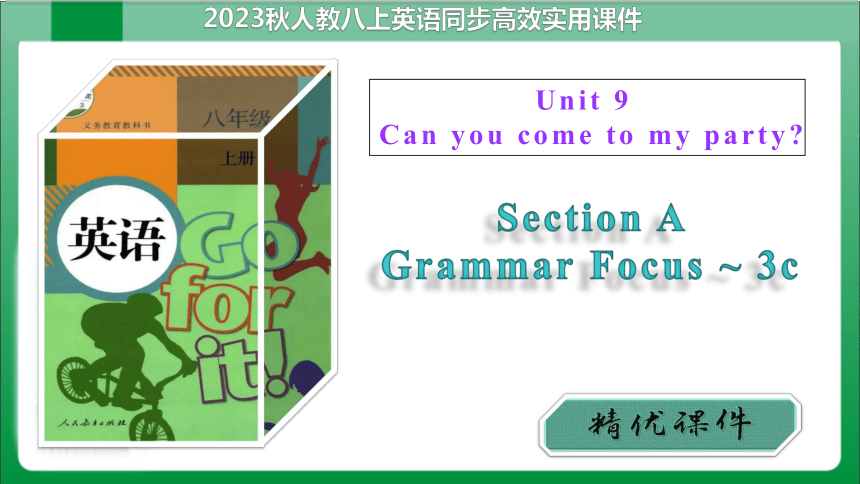
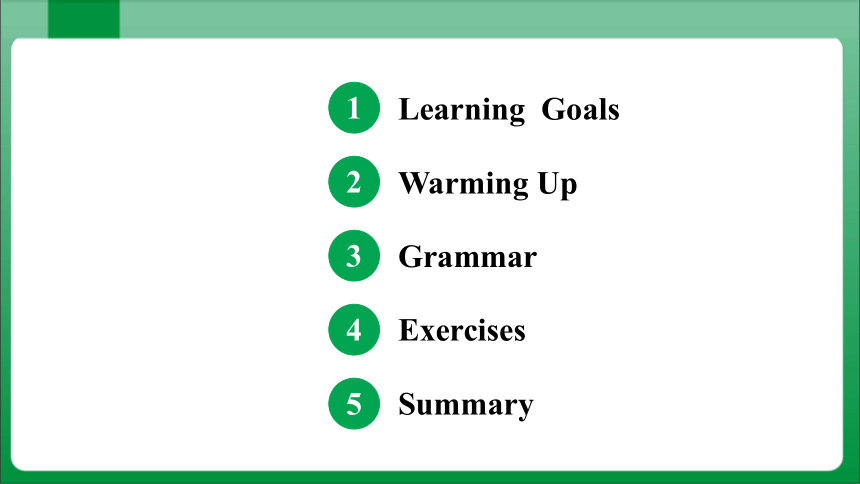
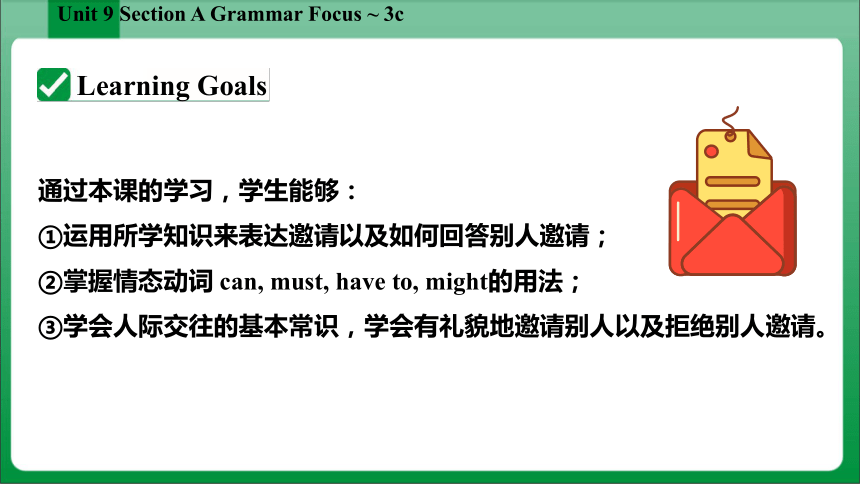
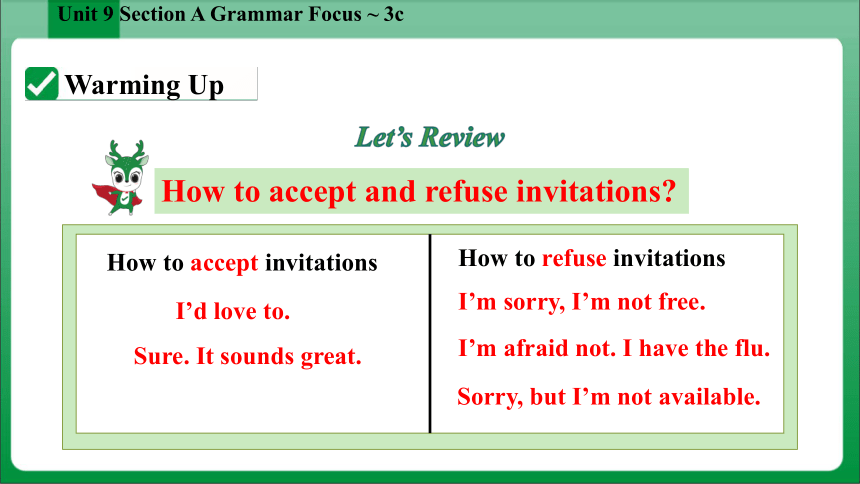
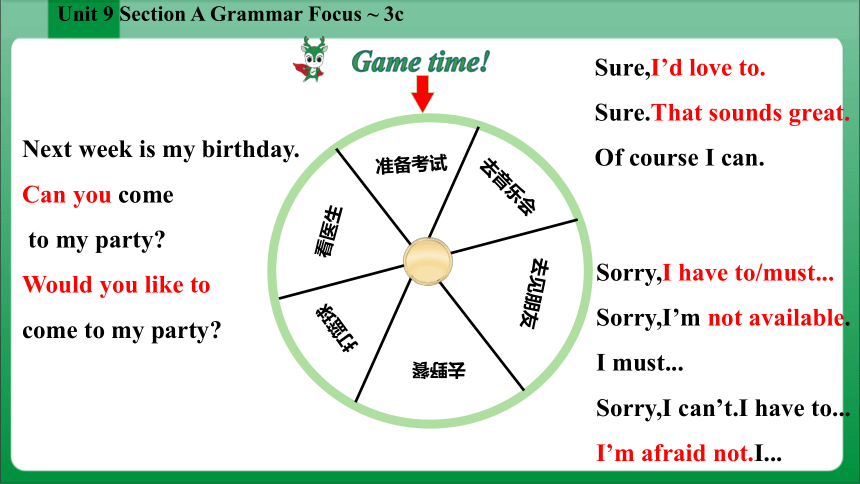
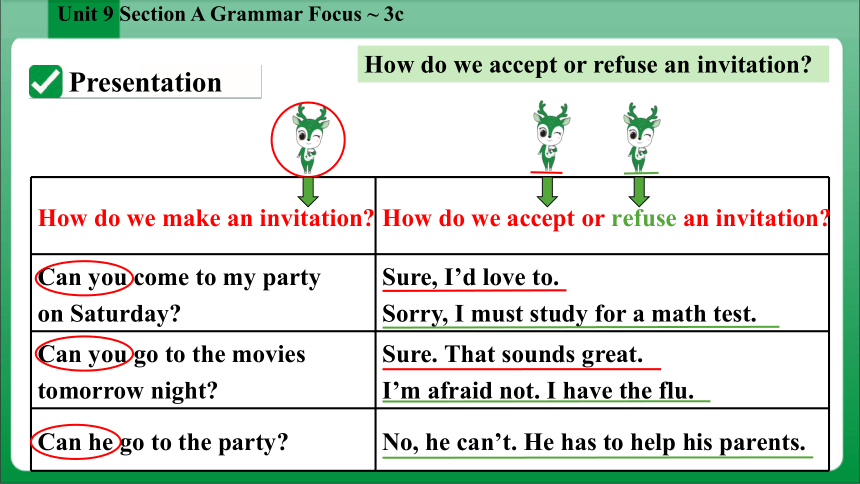
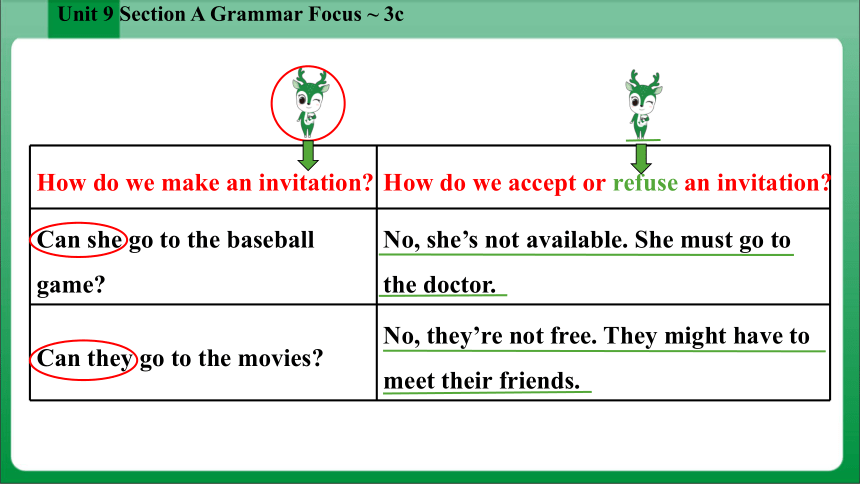
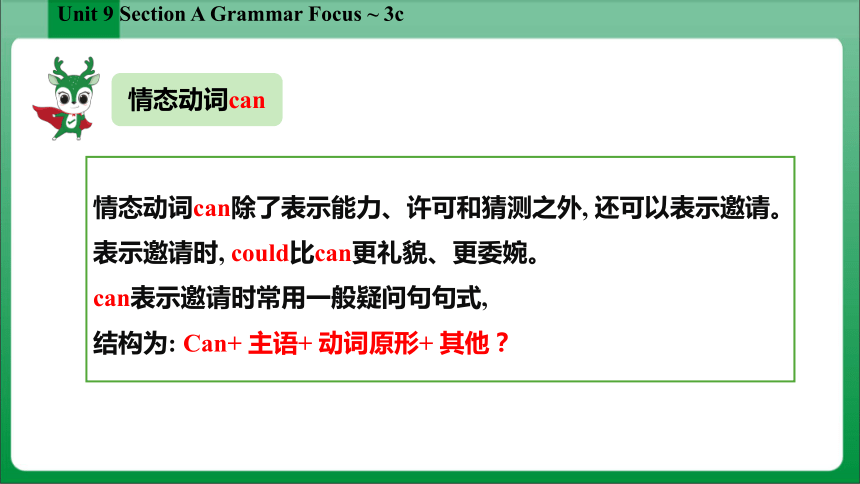
文档简介
(共28张PPT)
人教八上英语同步精品课件
人教版八年级上册
Unit 9
Can you come to my party
Section A
Grammar Focus ~ 3c
Learning Goals
Warming Up
Grammar
Summary
Exercises
1
1
2
3
4
5
通过本课的学习,学生能够:
①运用所学知识来表达邀请以及如何回答别人邀请;
②掌握情态动词 can, must, have to, might的用法;
③学会人际交往的基本常识,学会有礼貌地邀请别人以及拒绝别人邀请。
Learning Goals
Let’s Review
How to refuse invitations
How to accept invitations
I’m sorry, I’m not free.
I’m afraid not. I have the flu.
Sorry, but I’m not available.
Sure. It sounds great.
I’d love to.
How to accept and refuse invitations
Warming Up
Game time!
准备考试
看医生
去音乐会
打篮球
去野餐
去见朋友
Next week is my birthday.
Can you come
to my party
Would you like to
come to my party
Sure,I’d love to.
Sure.That sounds great.
Of course I can.
Sorry,I have to/must...
Sorry,I’m not available.
I must...
Sorry,I can’t.I have to...
I’m afraid not.I...
How do we make an invitation How do we accept or refuse an invitation
Can you come to my party on Saturday Sure, I’d love to.
Sorry, I must study for a math test.
Can you go to the movies tomorrow night Sure. That sounds great.
I’m afraid not. I have the flu.
Can he go to the party No, he can’t. He has to help his parents.
Presentation
How do we accept or refuse an invitation
How do we make an invitation How do we accept or refuse an invitation
Can she go to the baseball game No, she’s not available. She must go to the doctor.
Can they go to the movies No, they’re not free. They might have to meet their friends.
情态动词can
情态动词can除了表示能力、许可和猜测之外, 还可以表示邀请。表示邀请时, could比can更礼貌、更委婉。
can表示邀请时常用一般疑问句句式,
结构为: Can+ 主语+ 动词原形+ 其他?
对于用情态动词can发出的邀请,回答时主要有两种情况:
接受:
①Sure/Yes, I’d love (like) to. 当然,我愿意。
②Sure/Of course. 当然。
拒绝:
①Sorry, I’m not available. 对不起,我没空。
②I’m sorry. I’m not free. I have to … 抱歉,我没空,我不得不……
③I’d love to, but I’m afraid I can’t. I must …我愿意,但是恐怕不行。我得……
情态动词might
情态动词 含义及用法 例句
might 表示请求, 许可, 意为“可以”, 语气比may更委婉
表示推测, 意为“可能”, 语气缓和,较委婉, 可能性低于may
may的过去式, 意为“可能”
Might I ask you a question
①He is away from the school. He might be happy.
②The noodles says that it might rain.
He said he might go tomorrow.
情态动词have to 与must
must 表示主观“必须”;have to表示客观客观需要, 即“不得不” 。
I don’t like this fridge. I must buy a new one.(必须)
This computer doesn’t work. We have to buy a new one. (不得不)
You must go to bed at ten tomorrow. (必须)
We (will) have to go to bed early tomorrow.(不得不)
Instant Training
一、单项选择
1. Dirty air and water are harmful. They______kill plants, and even people.
A. can B. can’t C. should D. shouldn’t
2. —Dad,______I go out with my friends tomorrow
—I’m afraid you can’t.
A. would B. may C. need D. should
二、用have to和must填空
1. Her mother is badly ill, so she_______call the doctor at midnight.
2. My parents said that we______study hard.
must
A
B
had to
三、根据所给问句或答语及括号内所给提示词语,完成下列对话。
1. —_______________________ (can, come, my party)
—Sure, I’d love to.
2. —Would you like to go out with me tonight
—_______________________. (afraid) I have to do my homework.
3. —Can Alice go skating with us tomorrow
—_______________________. (no) She has to take a singing lesson.
4. —Can they go to the cinema
—No, they are busy. _______________________. (might, have to, work)
Can you come to my party
I’m afraid not
No, she can’t
They might have to work
plete the answers with might and one of the phrases in the box.
watch TV on the weekend my cousin
visit my grandparents practice the violin
1. A: What are you going to do on Saturday
B: I'm not sure. I might __________________
2. A: What are you planning to do after school
B: I don’t know. _____________________________
practice the violin.
I might watch TV after school.
Practice
3. A: When will you finish the science homework
B: ___________________________________________
4. A: Who are you going to the movies with
B: ____________________________________
5. A: Are you free to come to my place on Saturday
B: _____________________________________________________
I’m not sure. I might finish it on the weekend.
I don’t know. I might go with my cousin.
I’m not sure. I might visit my grandparents on Saturday.
watch TV on the weekend my cousin
visit my grandparents practice the violin
plete the sentences below. Use the words in brackets to help you.
1. Inviting : _____________________________________(can/play tennis) Accepting : _____________________________________
2. Inviting : ___________________________________________________
__________(would like to/go to the movies)
Refusing : ________________________________
Reason: __________________________________(might have to)
Can you come to play tennis with me
Sure, I’d love to.
Would you like to go to the movies with us tomorrow
evening
I’m afraid not.
I might have to help my parents.
3. Inviting: _______________________________________
(can/hang out with us tonight)
Refusing : ________________________________________
Reason: __________________________________________ (must)
4. Inviting: ___________________________________________
(would like to/come to my birthday party)
Accepting: __________________________________
Can you hang out with us tonight
No, I can’t.
I must prepare for the math test.
Would you like to come to my birthday party
Sure. That sounds great
3c.Write down everything you have to do next week. Choose a day and time to have a party. Then invite classmates to your party.
A: Can you come to my party
B: When is it
A: Next week, on Thursday night.
B: I'm sorry. I have to study for a math test.
Production
MON.
TUE.
WED.
THUR.
FRI.
SAT.
SUN.
Now show your reports!
Exercises
一、根据句意及所给汉语提示,写出句中所缺单词。
1. We ________ (邀请) some foreign friends to that show yesterday.
2. They offered (提供) me a job and I ________ (接受) it.
3. On cold mornings the car always ________ (拒绝) to start.
4. On ________ (工作日) I’m usually in bed by ten o’clock.
invited
accepted
refuses
weekdays
A. So can you go to visit her with me this afternoon
B. How about Friday afternoon
C. I’m sorry.
D. We went swimming together last Friday.
E. Why don’t you come to my place
F. Catch you on Friday.
G. I have to practice dancing this afternoon.
二、根据对话内容,从方框中选择恰当的选项补全对话,其中有两项多余。
A: Hey, Gina. Do you know Kate
B: Of course. She’s your cousin. (1) ________
A: Yes, that’s right. She’s going to move to Beijing next week. (2) ________
B: I’d love to, but I’m afraid I can’t. (3) ________
A: That’s really too bad.
B: (4) ________ I’ll be free then.
A: Really That’s great.
B: Where shall we meet
A: Let’s meet at my home.
B: OK. (5) ________
D
F
B
G
A
1. Grammar:学会使用情态动词来发出邀请以及对邀请做出回答。
2. Key words and expressions: invite, accept, refuse, invite sb. to a party/wedding, invite sb. to do sth., refuse to do sth.
Summary
If you invite your partners to come to your party, please make a
survey about their responses.
实践与拓展
谢谢
21世纪教育网(www.21cnjy.com)
中小学教育资源网站
兼职招聘:
https://www.21cnjy.com/recruitment/home/admin
人教八上英语同步精品课件
人教版八年级上册
Unit 9
Can you come to my party
Section A
Grammar Focus ~ 3c
Learning Goals
Warming Up
Grammar
Summary
Exercises
1
1
2
3
4
5
通过本课的学习,学生能够:
①运用所学知识来表达邀请以及如何回答别人邀请;
②掌握情态动词 can, must, have to, might的用法;
③学会人际交往的基本常识,学会有礼貌地邀请别人以及拒绝别人邀请。
Learning Goals
Let’s Review
How to refuse invitations
How to accept invitations
I’m sorry, I’m not free.
I’m afraid not. I have the flu.
Sorry, but I’m not available.
Sure. It sounds great.
I’d love to.
How to accept and refuse invitations
Warming Up
Game time!
准备考试
看医生
去音乐会
打篮球
去野餐
去见朋友
Next week is my birthday.
Can you come
to my party
Would you like to
come to my party
Sure,I’d love to.
Sure.That sounds great.
Of course I can.
Sorry,I have to/must...
Sorry,I’m not available.
I must...
Sorry,I can’t.I have to...
I’m afraid not.I...
How do we make an invitation How do we accept or refuse an invitation
Can you come to my party on Saturday Sure, I’d love to.
Sorry, I must study for a math test.
Can you go to the movies tomorrow night Sure. That sounds great.
I’m afraid not. I have the flu.
Can he go to the party No, he can’t. He has to help his parents.
Presentation
How do we accept or refuse an invitation
How do we make an invitation How do we accept or refuse an invitation
Can she go to the baseball game No, she’s not available. She must go to the doctor.
Can they go to the movies No, they’re not free. They might have to meet their friends.
情态动词can
情态动词can除了表示能力、许可和猜测之外, 还可以表示邀请。表示邀请时, could比can更礼貌、更委婉。
can表示邀请时常用一般疑问句句式,
结构为: Can+ 主语+ 动词原形+ 其他?
对于用情态动词can发出的邀请,回答时主要有两种情况:
接受:
①Sure/Yes, I’d love (like) to. 当然,我愿意。
②Sure/Of course. 当然。
拒绝:
①Sorry, I’m not available. 对不起,我没空。
②I’m sorry. I’m not free. I have to … 抱歉,我没空,我不得不……
③I’d love to, but I’m afraid I can’t. I must …我愿意,但是恐怕不行。我得……
情态动词might
情态动词 含义及用法 例句
might 表示请求, 许可, 意为“可以”, 语气比may更委婉
表示推测, 意为“可能”, 语气缓和,较委婉, 可能性低于may
may的过去式, 意为“可能”
Might I ask you a question
①He is away from the school. He might be happy.
②The noodles says that it might rain.
He said he might go tomorrow.
情态动词have to 与must
must 表示主观“必须”;have to表示客观客观需要, 即“不得不” 。
I don’t like this fridge. I must buy a new one.(必须)
This computer doesn’t work. We have to buy a new one. (不得不)
You must go to bed at ten tomorrow. (必须)
We (will) have to go to bed early tomorrow.(不得不)
Instant Training
一、单项选择
1. Dirty air and water are harmful. They______kill plants, and even people.
A. can B. can’t C. should D. shouldn’t
2. —Dad,______I go out with my friends tomorrow
—I’m afraid you can’t.
A. would B. may C. need D. should
二、用have to和must填空
1. Her mother is badly ill, so she_______call the doctor at midnight.
2. My parents said that we______study hard.
must
A
B
had to
三、根据所给问句或答语及括号内所给提示词语,完成下列对话。
1. —_______________________ (can, come, my party)
—Sure, I’d love to.
2. —Would you like to go out with me tonight
—_______________________. (afraid) I have to do my homework.
3. —Can Alice go skating with us tomorrow
—_______________________. (no) She has to take a singing lesson.
4. —Can they go to the cinema
—No, they are busy. _______________________. (might, have to, work)
Can you come to my party
I’m afraid not
No, she can’t
They might have to work
plete the answers with might and one of the phrases in the box.
watch TV on the weekend my cousin
visit my grandparents practice the violin
1. A: What are you going to do on Saturday
B: I'm not sure. I might __________________
2. A: What are you planning to do after school
B: I don’t know. _____________________________
practice the violin.
I might watch TV after school.
Practice
3. A: When will you finish the science homework
B: ___________________________________________
4. A: Who are you going to the movies with
B: ____________________________________
5. A: Are you free to come to my place on Saturday
B: _____________________________________________________
I’m not sure. I might finish it on the weekend.
I don’t know. I might go with my cousin.
I’m not sure. I might visit my grandparents on Saturday.
watch TV on the weekend my cousin
visit my grandparents practice the violin
plete the sentences below. Use the words in brackets to help you.
1. Inviting : _____________________________________(can/play tennis) Accepting : _____________________________________
2. Inviting : ___________________________________________________
__________(would like to/go to the movies)
Refusing : ________________________________
Reason: __________________________________(might have to)
Can you come to play tennis with me
Sure, I’d love to.
Would you like to go to the movies with us tomorrow
evening
I’m afraid not.
I might have to help my parents.
3. Inviting: _______________________________________
(can/hang out with us tonight)
Refusing : ________________________________________
Reason: __________________________________________ (must)
4. Inviting: ___________________________________________
(would like to/come to my birthday party)
Accepting: __________________________________
Can you hang out with us tonight
No, I can’t.
I must prepare for the math test.
Would you like to come to my birthday party
Sure. That sounds great
3c.Write down everything you have to do next week. Choose a day and time to have a party. Then invite classmates to your party.
A: Can you come to my party
B: When is it
A: Next week, on Thursday night.
B: I'm sorry. I have to study for a math test.
Production
MON.
TUE.
WED.
THUR.
FRI.
SAT.
SUN.
Now show your reports!
Exercises
一、根据句意及所给汉语提示,写出句中所缺单词。
1. We ________ (邀请) some foreign friends to that show yesterday.
2. They offered (提供) me a job and I ________ (接受) it.
3. On cold mornings the car always ________ (拒绝) to start.
4. On ________ (工作日) I’m usually in bed by ten o’clock.
invited
accepted
refuses
weekdays
A. So can you go to visit her with me this afternoon
B. How about Friday afternoon
C. I’m sorry.
D. We went swimming together last Friday.
E. Why don’t you come to my place
F. Catch you on Friday.
G. I have to practice dancing this afternoon.
二、根据对话内容,从方框中选择恰当的选项补全对话,其中有两项多余。
A: Hey, Gina. Do you know Kate
B: Of course. She’s your cousin. (1) ________
A: Yes, that’s right. She’s going to move to Beijing next week. (2) ________
B: I’d love to, but I’m afraid I can’t. (3) ________
A: That’s really too bad.
B: (4) ________ I’ll be free then.
A: Really That’s great.
B: Where shall we meet
A: Let’s meet at my home.
B: OK. (5) ________
D
F
B
G
A
1. Grammar:学会使用情态动词来发出邀请以及对邀请做出回答。
2. Key words and expressions: invite, accept, refuse, invite sb. to a party/wedding, invite sb. to do sth., refuse to do sth.
Summary
If you invite your partners to come to your party, please make a
survey about their responses.
实践与拓展
谢谢
21世纪教育网(www.21cnjy.com)
中小学教育资源网站
兼职招聘:
https://www.21cnjy.com/recruitment/home/admin
同课章节目录
- Unit 1 Where did you go on vacation?
- Section A
- Section B
- Unit 2 How often do you exercise?
- Section A
- Section B
- Unit 3 I'm more outgoing than my sister.
- Section A
- Section B
- Unit 4 What's the best movie theater?
- Section A
- Section B
- Unit 5 Do you want to watch a game show?
- Section A
- Section B
- Unit 6 I'm going to study computer science.
- Section A
- Section B
- Unit 7 Will people have robots?
- Section A
- Section B
- Unit 8 How do you make a banana milk shake?
- Section A
- Section B
- Unit 9 Can you come to my party?
- Section A
- Section B
- Unit 10 If you go to the party, you'll have a grea
- Section A
- Section B
